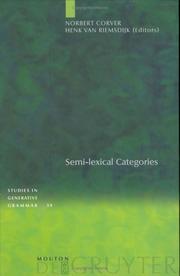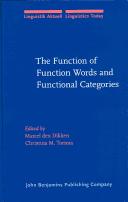| Listing 1 - 5 of 5 |
Sort by
|
Book
ISBN: 0191879835 0192582569 9780192582560 9780198844297 Year: 2020 Publisher: Oxford Oxford University Press
Abstract | Keywords | Export | Availability | Bookmark
 Loading...
Loading...Choose an application
- Reference Manager
- EndNote
- RefWorks (Direct export to RefWorks)
This volume explores the question of why languages - even those spoken in the same geographical area by people who share similar social structures, occupations, and religious beliefs - differ in the meanings expressed by their grammatical systems. Zygmunt Frajzyngier and Marielle Butters outline a new methodology to explore these differences, and to discover the motivations behind the emergence of meanings. The motivations that they identify include: thecommunicative need triggered when the grammatical system inherently produces ambiguities; the principle of functional transparency; the opportunistic emergence of meaning, whereby unoccupied formal niches acquire a new function; metonymic emergence, whereby a property of an existing function receives a formalmeans of its own, thus creating a new function; and the emergence of functions through language contact. The book offers new analyses of a range of phenomena across different languages, such as benefactives and progressives in English, and point of view of the subject and goal orientation in Chadic languages. It also draws on a wealth of data from other languages including French, Spanish, Polish, Russian, and a variety of less familiar Sino-Russian idiolects.
Grammar, Comparative and general --- Closed-class words (Grammar) --- Empty words (Grammar) --- Form words (Grammar) --- Function words (Grammar) --- Functors (Grammar) --- Grammatical words (Grammar) --- Structural words (Grammar) --- Function words. --- Closed-class words --- Empty words --- Form words --- Functors --- Grammatical words --- Structural words --- Function words --- E-books --- Grammar --- Comparative linguistics --- Linguistics --- Philology
Book
ISBN: 9789027256836 9789027265258 9027265259 9027256837 Year: 2017 Publisher: Amsterdam John Benjamins Publishing Company
Abstract | Keywords | Export | Availability | Bookmark
 Loading...
Loading...Choose an application
- Reference Manager
- EndNote
- RefWorks (Direct export to RefWorks)
The present volume is centered on the notional domain of 'additivity'. Many linguistic phenomena are based on additivity (i.e. are incremental) and additive relations are a mechanism that underlies a wide array of text types. Specifically, the present volume is centered on the class of function words which have been labeled, among many others, 'Additive Focusing Modifiers' (FMs). The chapters gathered in this volume deal with the syntactic, prosodic and pragmatic properties of Additive FMs and new lines of research on these items are pursued, including (i) the historical development of Additive FMs and the use of these forms in older stages of the European languages; (ii) the pragmatic and sociolinguistic properties of Additive FMs, in particular of the functions they play in discourse and their distribution in different language varieties; (iii) the processing of Additive FMs by adults, in particular by relying on reading experiments involving eye tracking and self-paced reading; (iv) the use of Additive FMs in language contact situations and (v) the acquisition of Additive FMs by different learner groups.
Grammar, Comparative and general --- Closed-class words (Grammar) --- Empty words (Grammar) --- Form words (Grammar) --- Function words (Grammar) --- Functors (Grammar) --- Grammatical words (Grammar) --- Structural words (Grammar) --- Particles (Grammar) --- Particles. --- Function words. --- Closed-class words --- Empty words --- Form words --- Functors --- Grammatical words --- Structural words --- Function words --- Pragmatics --- Comparative linguistics --- Germanic languages --- Romance languages --- Slavic languages --- LANGUAGE ARTS & DISCIPLINES / Grammar & Punctuation. --- LANGUAGE ARTS & DISCIPLINES / Linguistics / Syntax. --- Germanische Sprachen. --- Modifikator. --- Romanische Sprachen. --- Slawische Sprachen.

ISBN: 3110874008 3110166852 3111786129 9783110874006 9783110166859 9783110166859 Year: 2001 Volume: 59 Publisher: Berlin Mouton de Gruyter
Abstract | Keywords | Export | Availability | Bookmark
 Loading...
Loading...Choose an application
- Reference Manager
- EndNote
- RefWorks (Direct export to RefWorks)
The distinction between functional categories and lexical categories is at the heart of present-day grammatical theory, in theories on language acquisition, code-switching and aphasia. At the same time, it has become clear, however, that there are many lexical items for which it is less easy to decide whether they side with the lexical categories or the functional ones. This book deals with the grammatical behavior of such in- between-categories, which are referred to here as "semi-lexical categories".
Grammar, Comparative and general --- Semantics. --- Function words. --- Syntax. --- Lexicology. Semantics --- Grammar --- -Grammar, Comparative and general --- -Semantics --- Formal semantics --- Semasiology --- Semiology (Semantics) --- Comparative linguistics --- Information theory --- Language and languages --- Lexicology --- Meaning (Psychology) --- Comparative grammar --- Grammar, Philosophical --- Grammar, Universal --- Philosophical grammar --- Linguistics --- Philology --- Function words --- Syntax --- Grammar, Comparative --- Closed-class words (Grammar) --- Empty words (Grammar) --- Form words (Grammar) --- Function words (Grammar) --- Functors (Grammar) --- Grammatical words (Grammar) --- Structural words (Grammar) --- Closed-class words --- Empty words --- Form words --- Functors --- Grammatical words --- Structural words --- Semantics --- Grammar, Comparative and general Syntax

ISBN: 1282156624 9786612156625 902729433X 9789027294333 9027228027 Year: 2005 Publisher: Amsterdam Philadelphia J. Benjamins Pub.
Abstract | Keywords | Export | Availability | Bookmark
 Loading...
Loading...Choose an application
- Reference Manager
- EndNote
- RefWorks (Direct export to RefWorks)
This volume brings together papers which address a range of issues regarding the syntax of function words and functional categories in the Germanic languages. The works offered in this volume derive specifically from comparative studies of Germanic; at the same time they all bear directly on long-standing problems in syntactic theory and universal grammar. The contributions include novel theoretical and empirical approaches to infinitives, the syntax and acquisition of Verb Second, the structure and interpretation of present tense, the syntax and semantics of reflexives, the relationship between expletive syntax and the EPP, the syntax of possession, and the DP-internal syntax of pronouns. Some contributions present the results of experimental research which provide an entirely fresh perspective on previously unchallenged claims.
Grammar, Comparative and general --- Functionalism (Linguistics) --- Categories, Grammatical --- Grammatical categories --- Categorization (Linguistics) --- Componential analysis (Linguistics) --- Functional analysis (Linguistics) --- Functional grammar --- Functional linguistics --- Functional-structural analysis (Linguistics) --- Grammar, Functional --- Grammatical functions --- Linguistics --- Structural linguistics --- Closed-class words (Grammar) --- Empty words (Grammar) --- Form words (Grammar) --- Function words (Grammar) --- Functors (Grammar) --- Grammatical words (Grammar) --- Structural words (Grammar) --- Function words. --- Grammatical categories. --- Major form classes --- Closed-class words --- Empty words --- Form words --- Functors --- Grammatical words --- Structural words --- 801.56 --- 801.56 Syntaxis. Semantiek --- Syntaxis. Semantiek --- Function words --- Philology

ISBN: 0415060443 9780415060448 Year: 1991 Publisher: London Routledge
Abstract | Keywords | Export | Availability | Bookmark
 Loading...
Loading...Choose an application
- Reference Manager
- EndNote
- RefWorks (Direct export to RefWorks)
Lexicology. Semantics --- Grammar, Comparative and general --- Semantics --- Typology (Linguistics) --- Mots fonctionnels --- Particules (Linguistique) --- Sémantique --- Typologie (Linguistique) --- Function words --- Particles --- Semantics. --- Particles. --- Function words. --- 801.56 --- -Grammar, Comparative and general --- -Semantics --- Language and languages --- Linguistic typology --- Linguistics --- Linguistic universals --- Formal semantics --- Semasiology --- Semiology (Semantics) --- Comparative linguistics --- Information theory --- Lexicology --- Meaning (Psychology) --- Comparative grammar --- Grammar --- Grammar, Philosophical --- Grammar, Universal --- Philosophical grammar --- Philology --- Syntaxis. Semantiek --- Typology --- Classification --- Grammar, Comparative --- Vergelijkende en algemene grammatica --- partikels --- 801.56 Syntaxis. Semantiek --- Typology (Linguistics). --- partikels. --- Partikels. --- Sémantique --- Particles (Grammar) --- Closed-class words (Grammar) --- Empty words (Grammar) --- Form words (Grammar) --- Function words (Grammar) --- Functors (Grammar) --- Grammatical words (Grammar) --- Structural words (Grammar) --- Closed-class words --- Empty words --- Form words --- Functors --- Grammatical words --- Structural words --- Grammar, Comparative and general Particles --- Grammar, Comparative and general - Particles. --- Grammar, Comparative and general - Function words. --- Grammaire comparée et générale --- Typologie (linguistique) --- Particules
| Listing 1 - 5 of 5 |
Sort by
|

 Search
Search Feedback
Feedback About UniCat
About UniCat  Help
Help News
News